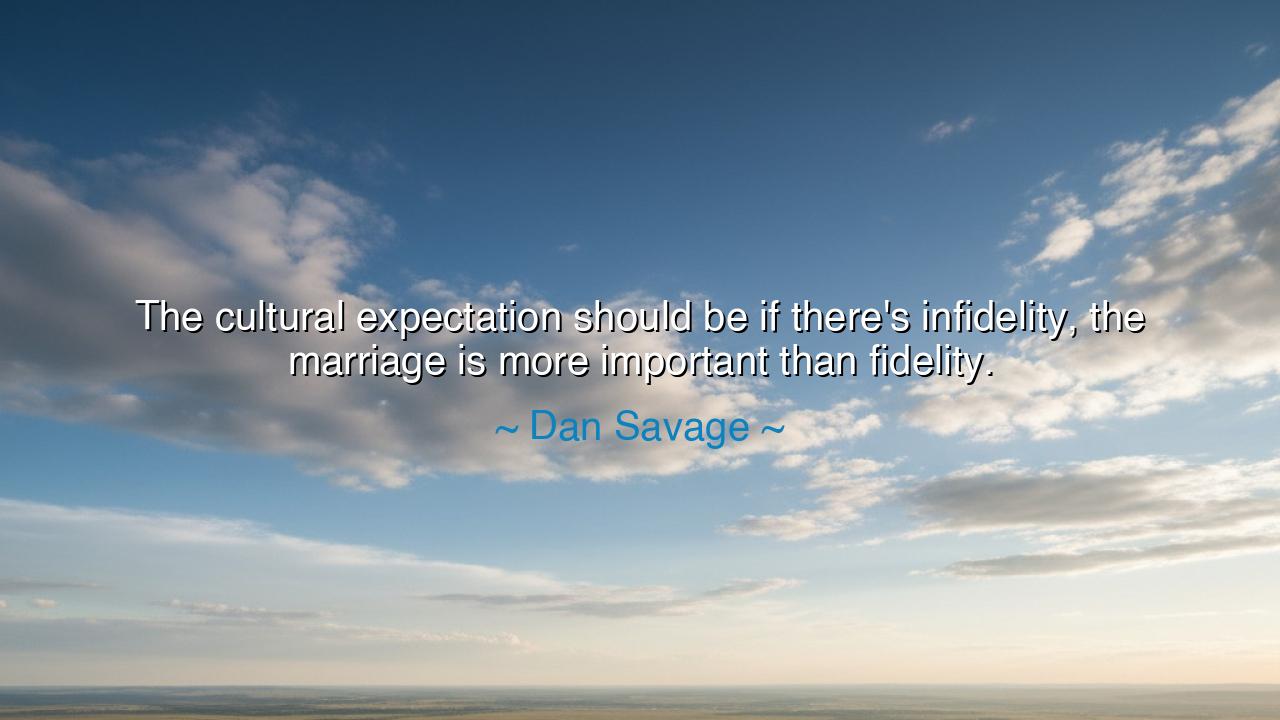
The cultural expectation should be if there's infidelity, the
The cultural expectation should be if there's infidelity, the marriage is more important than fidelity.






O Children of the Future, gather and hear the wisdom that flows from the words of Dan Savage, for his reflection on love and marriage speaks to the very heart of what it means to be human. He declares, "The cultural expectation should be if there's infidelity, the marriage is more important than fidelity." These words challenge the very fabric of traditional morality, suggesting that the core of marriage is not bound to the rigid expectation of fidelity, but to the deeper, more complex notion of the relationship itself—the love, the partnership, and the bond that unites two people. The marriage, he suggests, is greater than any single act of betrayal, for it is the love that sustains, not the adherence to a single, narrow principle.
In the ancient world, marriage was often seen as a contract, an institution designed to maintain the stability of the family and the society. Homer, in his epic poems, described Penelope’s loyalty to Odysseus, despite his long absence. Her faithfulness was seen as the ideal for women, and the idea of fidelity in marriage was firmly rooted in societal expectations. Plato, in his dialogues, spoke of love as the highest form of human connection, yet even he struggled with the complexities of relationships and loyalties. Fidelity, in these ancient times, was revered not for its humanity, but for its ability to preserve order. Marriage, therefore, was often treated as a structure that needed to be maintained at all costs, even at the expense of deeper emotions or personal growth.
Yet, as Dan Savage reminds us, the expectation of fidelity is a concept bound by tradition and often fails to recognize the humanity of the individuals within the marriage. The ancient Greeks, who sought wisdom in virtue and truth, understood that love and commitment could not be confined by narrow laws. Socrates, in his musings on the nature of love, would challenge his disciples to go beyond the superficial expectations placed upon love, seeking instead the deeper, philosophical understanding of human connection. Fidelity, he might argue, is not the sole test of a marriage's strength; rather, it is the willingness to grow together, to support one another, and to remain compassionate and forgiving in the face of imperfections.
Let us now turn to the story of King Henry VIII and Catherine of Aragon, a tale of marriage, infidelity, and the quest for personal desires. Henry’s desire for a male heir led him to seek the annulment of his marriage to Catherine, and his actions not only shattered the traditional understanding of marriage in the Catholic Church, but also set the stage for the establishment of the Church of England. Here, we see a monarch who valued his own desires over the institution of marriage, but the lessons from this historical moment are profound. Henry’s infidelity, while leading to a break in his marriage, also led to the destruction of many relationships, not only his own. This demonstrates that fidelity in its rigid form does not always serve the greater good of the union. In contrast, a marriage that is able to withstand betrayal and still recognize the value of the relationship itself is the one that can endure the test of time.
Now, O Children, let us look to the modern world, where relationships are no longer bound by the same rigid expectations as in the past. Dan Savage’s words are a call to see marriage not as a structure solely defined by fidelity, but as a bond that must be built on the principles of love, understanding, and forgiveness. When infidelity arises, as it often does in the complexities of human relationships, the true test of marriage is not in the betrayal itself, but in the ability of both partners to navigate the challenge with grace and mutual respect. A marriage that survives such a test and continues to thrive is not one based merely on external actions, but on the internal strength of the bond itself.
The lesson, O Children, is clear: marriage is not a simple contract, nor is it a prison built on the walls of fidelity. It is a living, breathing relationship that requires ongoing commitment, compassion, and above all, understanding. Infidelity does not define the worth of a marriage; rather, it is the ability of both individuals to work together through such challenges and find a way to heal and grow. The greater value lies not in the perfection of their actions but in the strength of their bond, the willingness to forgive, and the ability to prioritize the marriage itself above all else.
So, O Children, take this wisdom with you: marriage is not defined by perfection, nor by the mistakes that we make. It is defined by the depth of the connection and the commitment to grow together through the trials of life. When infidelity strikes, it is the relationship, not the single act, that must be protected and valued. Fidelity is not the sole test of love—it is the strength of the marriage that endures. Nurture your relationships with respect, understanding, and forgiveness, and you will build a bond that can weather any storm, knowing that love and commitment are the true foundations of a lasting union.






AAdministratorAdministrator
Welcome, honored guests. Please leave a comment, we will respond soon